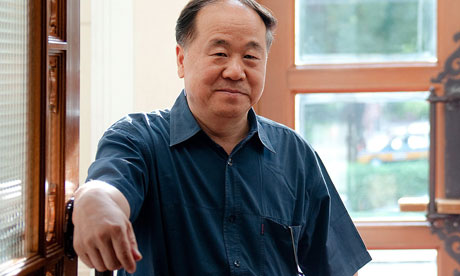In first major interview since winning the literature prize, novelist insists his portrayal as a Chinese 'state writer' is unfair

Mo Yan: 'My political views are quite
clear'. Photograph: Yan Bo/EPA
Mo Yan, winner of the Nobel prize for
literature, has taken on the critics who have dismissed him for being too
close to the Chinese government, saying they envy him the award and are
distorting the meaning of his work.
In a rare interview – his
first major public conversation since winning the Nobel last autumn – the author
whose pen name means "don't speak" spoke out on a number of issues in what
translator Eric Abrahamsen said was "probably as close as Mo Yan will ever come
to an admission of his full political position in China".
Mo has been lambasted by
Chinese dissidents including the artist Ai Weiwei for, in Ai's
words, "clearly pursuing the party's line and in several cases [showing] no
respect for the independence of intellectuals". His refusal to sign a petition
calling for the release of the imprisoned Nobel peace prize winner Liu Xiaobo
led to him being
dismissed by Salman Rushdie as a "patsy of the regime", while his fellow
Nobel laureate Herta Müller called his win "a
slap in the face for all those working for democracy and human rights".
But in
an interview with the German paper Der Spiegel, Mo took on Ai's criticism
that he is too close to the state and does not represent China, asking "which
intellectual can claim to represent China? I certainly do not claim that. Can Ai
Weiwei? Those who can really represent China are digging dirt and paving roads
with their bare hands."
He also hit back at his
fellow Chinese author Liao
Yiwu, who last year called him a "state writer" who failed to keep his
distance from the government. "I know he envies me for this award and I
understand this. But his criticism is unjustified," Mo told Der Spiegel, adding
that since he won the Nobel, his critics "use magnifying glasses to look for my
flaws and they even distort the meaning of my poems". One particular poem
attacked by Liao, he said, is not praising a disgraced party official, but is
actually satire.
And Mo pointed out that
while he
"openly expressed the hope" that Liu be freed, "again, I was immediately
criticised and forced to speak out again and again on the same issue … I am
reminded of the rituals of repetition in the Cultural Revolution. If I decide to
speak, then nobody will stop me. If I decide not to speak, then not even a knife
at my neck will make me speak."
Full article
No comments:
Post a Comment